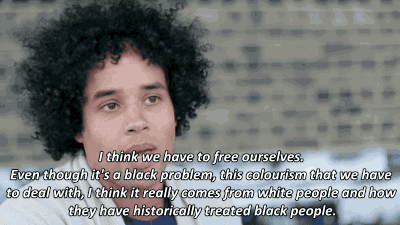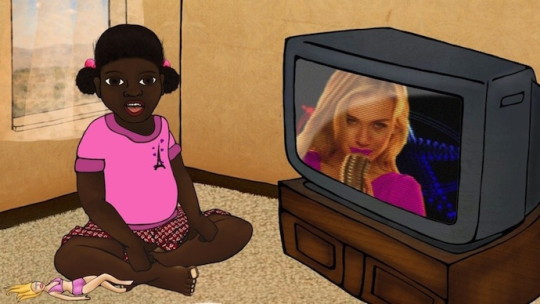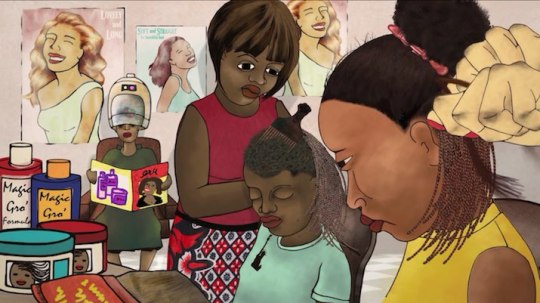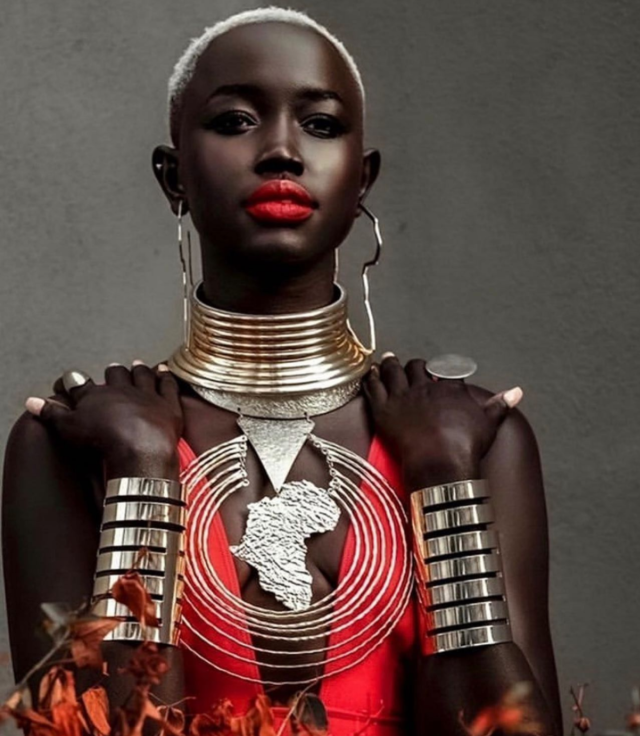#colourism
(Note: The terms “Black” and “African” are used interchangeably in this piece for contextualisation purposes.)
In 2001, Obrafour-arguably the most popular rapper in Ghana then- released his second album, Asem Sebe. On this album was the very popular love song, Odo. On Odo, Obrafour was basically professing his profound love for a certain Yaayaa Serwaa- a black woman, undoubtedly. (I would say ‘arguably’, but the video clarifies things.) In 2015, Sarkodiereleased his fourth album, Mary, and one of the numerous love songs on this album was ‘Always on my Mind’ (which incidentally featured Obrafour) and on it, Sark too was expressing his deep love for a black woman named Abena Amponsah. These two songs have a very curious and interesting thing in common: the rappers referring to these (black) love interests of theirs as white people, as a form of extollation and as terms of endearment- so we had Obrafour calling Yaayaa his 'white person’-mi broni, and Sarkodie calling Abena a 'black-white person’- tuntum broni.

In attempting to make a case for this very worrying situation, someone once responded to these observations saying something like, “perhaps, they’re only using the (o)broni term figuratively,” and i retorted, “that is exactly the problem.”
That whiteness has to be called upon to validate the beauty of a black woman. That whiteness has to be the standard, the default, the epitome when we’re talking about beauty and admiration. That a beautiful black woman can’t be just that -a beautiful black woman- without being referred to as a ’(black)-white’ person.
The fact of the matter is that this most unfortunate phenomenon is deeply rooted in colourism, and much deeper in the colonial experience. Simply, it is the reflection of a colonial mentality to have Africans feel the need to use phrases such as “mi broni” and “tuntum broni” to extol their love interests, who’re obviously African. After all, wasn’t it during the colonial experience that we were taught that everything 'white’ was aspirational, admirable, to be desired, and everything 'black’ on the other hand, disdainful, repulsive and to be abhorred?

This colourist “broni” business is of course, not limited to rap-in fact, it is much more prevalent in highlife music. It is not even limited to the music scene, but actually spread across our whole society. (Isn’t our music generally reflective of our society?) But for the purposes of this blog, the focus will be on rap/hip hop music in Ghana.
In decrying this mentality that breeds acts such as skin bleaching, most of our rappers, in their token 'conscious’ songs, often miss the mark.
In an industry whose (biggest) voices still use such anti-black(skin) terms such as tuntum broni, in an industry where we’re most likely to have have light skinned women featuring in music videos, where musicians feel the need to brag about the fact that the woman they dating is biracial, in an industry that basically suggests that 'the lighter, the better’-and therefore reinforces colourist ideals, you do not go about barking at people who bleach their skins. However well-intentioned these efforts may be, there is nothing conscious about attacking people who in this case, bleach their skins. A deeper look at it though, would reveal something ahistorical and hypocritical, and everything unconscious, about it all.

If artistes feel the need to make socially conscious and progressive songs (which is a very laudable thing), it is imperative that they educate themselves and also attack, instead of victims, the underlying ideas or structures that lead to whatever malaise within society they’re disgusted at. Unconsciously being part of a problem you cry against, is not cool. Neither is victim blaming.
In ‘Anthills of The Savannah,’ the late Chinua Achebe wrote a wonderful proverb. It says that “if you want to get to the root of murder, you have to look for the blacksmith who made the matchet.”
(Note: the last two photos are stills from this brilliant short film that explores colourism. Highly recommended.)

Dark Skin Offends
In the midst of all the public outrage over the comments of an unidentified senior royal being concerned about how dark Archie (Prince Harry and Meghan aka the Sussex’s son) will be, let’s have an honest conversation about the way dark skin and anything that has close proximity to Blackness offends not just white people but Black people too.
Unfortunately, this toxic colonial mindset is why so many of us have an inferiority complex,
Why too many Black men “prefer” to procreate with non-Black women,
Why so many Black women bleach their skin.
Why fair skinned or Bi-racial babies are given more likes, follows and positive comments on social media.
Why often so many of us feel honoured to be invited to white establishments
(I could go on…feel free to add your thoughts in the comments)
Although, our colonisers taught us to hate our richly melanated skin, we’ve got to do better and change the narrative once and for all, by cherishing, respecting, and valuing our Beautiful Black Skin.
If we don’t, who will ?
Author - @iameriwa
Model - @duta_atem

iHeartOG is not Ugly our ideology of Beauty is
I’m disappointed with the negative and dehumanising discourse sounding the “attractiveness” of Ogom Chijindu aka Og, the Nigerian-American reality television personality who appears on Basketball Wives LA.
Please let’s do our best to speak with compassion and understanding, particularly, when it concerns black dark skin women with distinct Afrocentric phenotypes.
The notion that featurismim isn’t real is undermining Og’s (and many other women who look like her) lived experience.
We must acknowledge that, like its ugly cousin RACISM, colourism, featurismim and texturism are all deeply ingrained within our psyche due to the success of White Supremacy.
If featurismim isn’t a thing then why is rhinoplasty surgery so popular among black and brown people? Kelly Rowland, Ciara, Halle Berry and other black female celebrities have surgically alerted their “Afrocentric phenotypes” because anything that has close proximity to whiteness is deemed more attractive.
Unfortunately, European colonizers have successfully engraved their standard of beauty in our minds, that we also succumb to their destructive ideologies by changing the texture of our hair ( or wearing straighter no Afrocentric weaves), lightening our skin complexion, and undergoing invasive (and no intrusive) surgery to alter our distinct African negroid features.
The whole premise of “Pretty for a Dark-skin Girl” is rooted in colourism and featurismim. As the said black girl/woman is deemed attractive because she doesn’t aesthetically look “too African” or “too Black” i.e. she doesn’t have a wide nose, a big pertruding mouth with thick lips, large eyes, basically features that are typically considered “animalistic” or “ugly”.
The gag is, our entire understanding of facial symmetry and perception of beauty was created by old white male biologists/scientists. Therefore, it isn’t surprising that our preferences for lighter skin, softer and slimmer facial features are running rampant in the Black and Brown countries white Europeans colonised ♀️
Let’s re-educate ourselves so we can teach our children that beauty is nuanced, multifaceted, diverse, but more importantly, beauty is skin deep.
Author - @iameriwa
Model - @iheartog

Bridgerton: Colourism in Action
I finally got round to watching the Netflix series Bridgerton, by Executive producer Shonda Rhimes.
Like many Black women, I was eager to watch a fictitious show that would hopefully be “inclusive of all races” more importantly, I was sure that the show would go against the grain and cast Black dark skin women in leading roles.
I was sadly mistaken.
All the unambiguous looking Black women with dark to brown skin tones were casted as subservient characters with little to no lines, and used as part of the background scenery.
While the key female characters of colour were played by the following ambiguous looking Black women and Bi-racial women:
Golda Rosheuvel - plays Queen Charlotte
Adjoa Andoh - plays Lady Danbury
Ruby Barker - plays Marina Thompson
Kathryn Dysdale - plays Genevieve Delacroix
Emma Naomi plays - Alice Mondrich
I’m not surprised but I am disappointed, as this could have been avoided.
From a representation standpoint, Bridgerton is perpetuating the notion that Black women with light skin, particularly women with mixed ancestry, are more deserving of opportunities, admiration and a voice, over Black women with darker skin and Afrocentric phenotypes.
Colourism is just as dangerous on screen as it is off screen, as it reinforces the idea that dark skin is not good enough, or palatable for the dominate race to accept.
Anyway, I want to reinforce that lighter skin is not more beautiful than darker skin, they’re equally beautiful. However, I appreciate that so many, especially gatekeepers within media still haven’t got the memo.
Author - @iameriwa
